- Home
- Media Kit
- Current Issue
- Past Issues
- Ad Specs-Submission
- Ad Print Settings
- Reprints (PDF)
- Photo Specifications (PDF)
- Contact Us

![]()
ONLINE

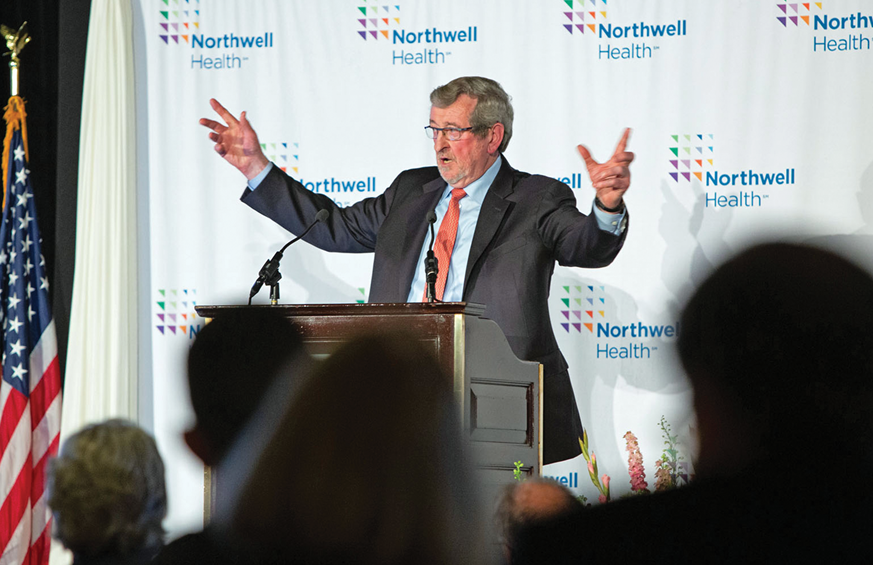
Each spring, Michael Dowling leads the combined annual meeting of Northwell’s Board of Trustees
and Board of Overseers, where he addresses previous successes and provides the goals for the upcoming year.
Made for This
Editors’ Note
Prior to assuming his current post in 2002, Michael Dowling was the health system’s Executive Vice President and Chief Operating Officer. Before joining Northwell Health in 1995, he was a Senior Vice President at Empire Blue Cross/Blue Shield. Dowling also served in New York State government for 12 years, including seven years as State Director of Health, Education, and Human Services and Deputy Secretary to the governor and the final two years as Commissioner of the New York State Department of Social Services. Earlier, Dowling was a Professor of Social Policy and Assistant Dean at the Fordham University Graduate School of Social Services and Director of the Fordham campus in Westchester County. He has been honored with many awards and recognitions over the years, including being selected as the 2017 Grand Marshal of the New York City St. Patrick’s Day Parade, the 2012 B’nai B’rith National Healthcare Award, the Ellis Island Medal of Honor, the 2011 Gail L. Warden Leadership Excellence Award from the National Center for Healthcare Leadership, the 2011 CEO Information Technology Award from Modern Healthcare magazine and the Healthcare Information and Management Systems Society, the National Human Relations Award from the American Jewish Committee, the Distinguished Public Service Award from the State University of New York’s Nelson A. Rockefeller College of Public Affairs and Policy, an Outstanding Public Service Award from the Mental Health Association of New York State, an Outstanding Public Service Award from the Mental Health Association of Nassau County, the Alfred E. Smith Award from the American Society for Public Administration, the Deming Cup from the Columbia School of Business and the Gold Medal from the American Irish Historical Society. For 13 consecutive years, Modern Healthcare has ranked Dowling on its annual list of the “100 Most Powerful People in Healthcare,” including the #2 ranking in 2020. He was also ranked #44 among large company CEOs in the U.S. and was the nation’s top-ranking healthcare/hospital CEO on Glassdoor’s “Top CEOs in 2019” list. Dowling is past Chair of the Healthcare Institute and the current Chair of the Institute for Healthcare Improvement (IHI). He is a member of the Institute of Medicine of the National Academies of Sciences and the North American Board of the Smurfit School of Business at University College, Dublin, Ireland. He also serves as a board member of the Long Island Association. He is past chair and a current board member of the National Center for Healthcare Leadership (NCHL), the Greater New York Hospital Association (GNYHA), the Healthcare Association of New York State (HANYS) and the League of Voluntary Hospitals of New York. Dowling was an instructor at the Center for Continuing Professional Education at the Harvard School of Public Health. He earned his undergraduate degree from University College Cork (UCC), Ireland, and his master’s degree from Fordham University. He also has honorary doctorates from Queen’s University Belfast, University College Dublin, Hofstra University, Dowling College and Fordham University.
Institution Brief
Northwell Health (northwell.edu) delivers world-class clinical care throughout the New York metropolitan area, pioneering research at the Feinstein Institutes for Medical Research, and a visionary approach to medical education highlighted by the Zucker School of Medicine at Hofstra/Northwell and Hofstra Northwell School of Graduate Nursing and Physician Assistant Studies. Northwell Health is the largest integrated health system in New York State with a total workforce of more than 76,000 employees – the state’s largest private employer. With 23 hospitals, more than 830 outpatient facilities, including 220 primary care practices, 52 urgent care centers, home care, rehabilitation and end-of-life care services, Northwell is one of the nation’s largest health systems with $14 billion in annual revenue.
How critical is culture to the strength and leadership of Northwell Health?
Culture is the essence and DNA of any organization, and it requires you to work on it all the time. I look at it in a simple way. If you have the right people with the right attitude and the right perspective who can build trust, have strong interpersonal skills and are in the business for the right reason, you will create a personality for the organization that is people oriented, collaborative, and community and patient focused.
I, and my leadership team, spend a great deal of time on the people part of our business. It has many integrated components – team building, consistent communication, continuous education, leadership development, diversity and succession planning. It is always a work in progress and must be adaptable to changing circumstances. Our focus on this has been a key component of Northwell’s success to date.
“We have a statement, developed with input from employees, that is called ‘Made for This.’ It captures
the essence of our culture. We want employees who
are compassionate, innovative, caring, ambitious and team focused. In healthcare, every moment matters, every interaction matters. We are in the
customer service business.”
Does the focus on cultural fit start during the hiring process?
Yes, absolutely. We hire more than 150 employees each week. If we make the wrong decisions on who these individuals are, it will have a very negative impact on our organization. The opposite is also true, of course. This is why I meet with all new employees each Monday and have been doing so for over 20 years. It’s called New Beginnings and I spend over 90 minutes with them in a group session discussing the history of the organization, its mission, its components and, of course, its values and the behavior we require. I emphasize that they don’t just have a job at Northwell, they have an obligation and responsibility. We have a statement, developed with input from employees, that is called “Made for This.” It captures the essence of our culture. We want employees who are compassionate, innovative, caring, ambitious and team focused. In healthcare, every moment matters, every interaction matters. We are in the customer service business.
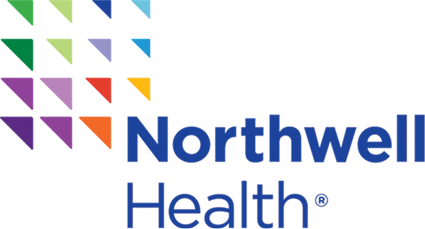
Healthcare has been shifting from the hospital to outpatient services and ambulatory care. Has the pandemic changed this movement as there was such a demand for an increased number of beds and hospital capabilities?
The growth of outpatient services will continue to grow. The advances in science, technology and clinical expertise allow much of what was once done in a hospital to now be done outside the hospital. However, the location of this care – especially surgery – has to be driven by the physician based on each patient’s unique circumstance. The role of the hospital, therefore, is changing, but this does not indicate or suggest that hospitals are not necessary. They will continue to be a major component of healthcare delivery given demographics and the aging of the population which drives more chronic illness and leads to more hospitalizations. In addition, as COVID clearly demonstrated, the availability of hospital beds is an imperative during a crisis. We will continue to search for balance between the need for hospital beds, the availability of accessible outpatient care and home care.
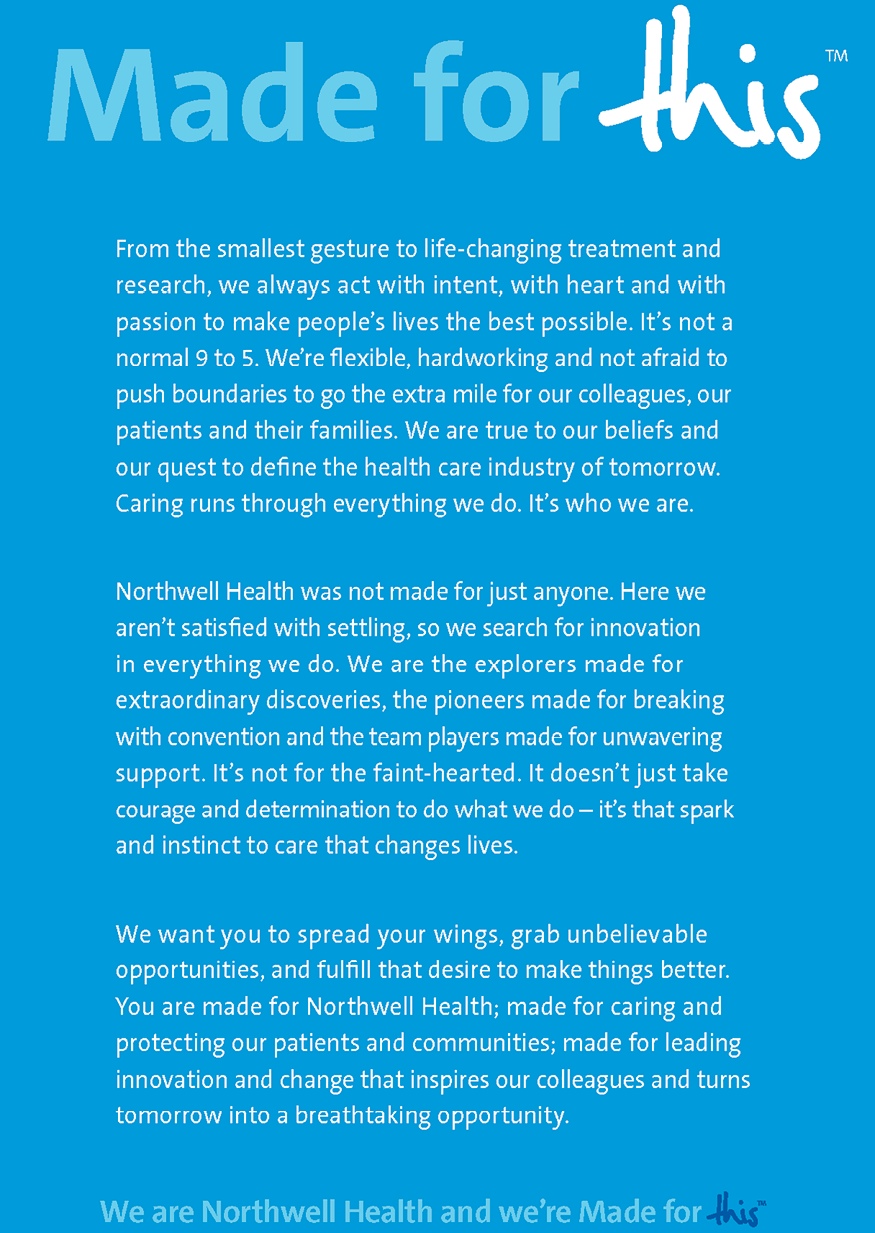
You often use the word hospitality when you talk about healthcare. Will you discuss Northwell Health’s focus on hospitality and being in the service business?
Patients are customers so we are in the customer service business as mentioned before and a primary goal is to build customer loyalty. Most people become patients for relatively short periods of time and during that time we must provide optimum clinical care and service, but we should also be their health partners for life – helping them to stay well and healthy by providing education, advice and support. This is a much broader perspective of our role and function.
What do you see as the role and responsibility that a health system has to the communities it serves?
We play a major role. In most communities where we exist, we are the largest employer and the largest service provider – in many ways, as COVID demonstrated, indispensable. Our influence is great but we can and must do more. As a CEO of a large organization, I believe you have two broad responsibilities. One is internal – managing and leading your organization to get the best results consistent with your mission. The second is external – how you use your influence to impact the well-being of the total community. You have a responsibility to the public at large. There is no shortage of issues and opportunities – gun violence (a public health issue), immigration, veterans services, environmental health, etc. We need to use our influence to address the toxic nature of our current politics, to bring some civility to our public discourse, to promote compromise and unity to build trust. The future is what we create and it has no room for bystanders. CEOs, as many have, must get in the arena.
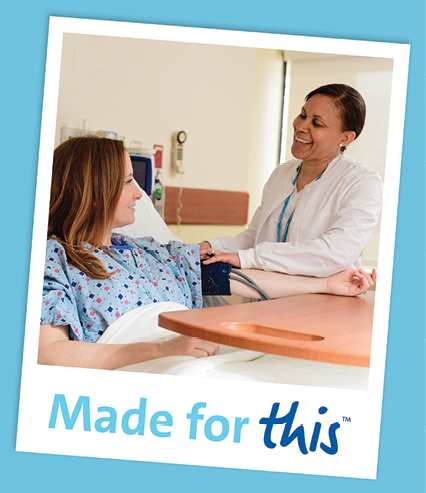
Does there need to be a strong public/private partnership to create impact on an issue such as gun violence?
Absolutely. This is an issue that needs all parties involved, from the government to the private sector to the clergy to community leaders, as well as to gun owners. Gun owners feel strongly about the right to carry arms, but for the most part they also feel strongly about the issue of gun safety. We need leaders to be the catalyst to bring all of these parties to the table which is what Northwell Health is trying to do around the issue of gun violence. We are engaging organizations around the country on this issue including the police since we need to have a strong police department. This does not mean that there are not institutional problems with the police, as there are with every organization, but the police are vitally important and we need to support the police and have them walking the streets and being involved in the community in order to build trust and confidence. We need pro-police reform, not anti-police. We are interdependent and need to bring all of the parts of the community together to work in harmony for the betterment of the whole. This is needed now more than ever in our society. We need to agree that compromise is good and positive.
“I strongly believe that employees, especially in the field of healthcare, don’t just want to work for the organization, they want to belong to a cause, a mission, a noble purpose. A leader has to communicate this purpose and, to do so, must truly understand the dynamics of the organization.”
How critical is it to focus on lessons learned from the pandemic in order to be best prepared for future crises?
COVID was an extraordinary learning experience. It impacted everyone and every organization and has forced a rethinking of how we adapt and transform. Going back to exactly the way we were pre-COVID is not possible. It tested us, changed our normal way of living, and impacted our family and work life. It also highlighted our strengths and shined a bright light on our weaknesses. We can, I believe, be better in the future because of it. The lessons are numerous: how to better prepare for the inevitable disasters that will happen in the future, how to use technology to improve healthcare delivery and access, how to manage a growing remote workforce, how to better support the communities and populations disproportionately impacted by COVID, and how to accelerate the innovation and adaptability so evidently required during the pandemic. The list is long. We also now need to re-evaluate our historic obsession on short-term thinking – such as monthly and quarterly metrics. We need a longer view – three to five years. It takes time and commitment to drive change and attain lasting, sustainable results. We now have an opportunity for a new beginning.
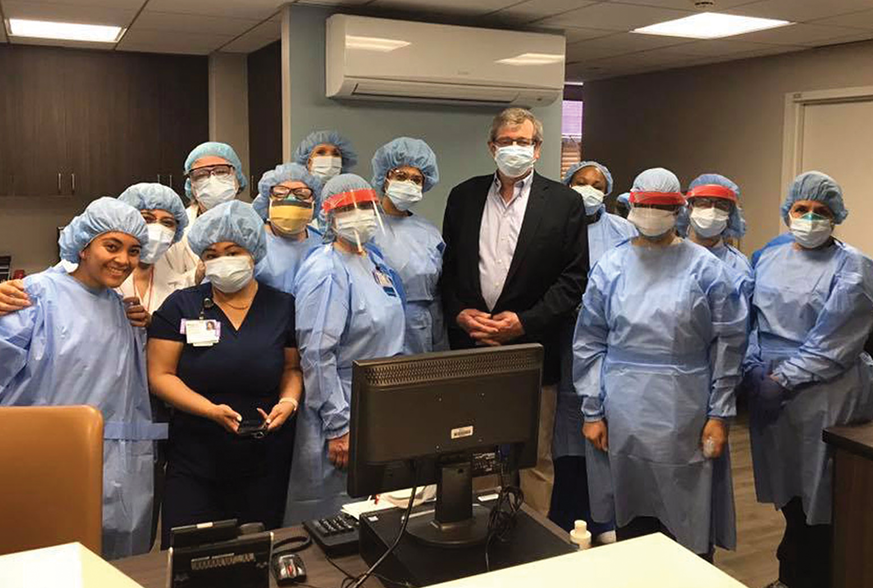
During the COVID-19 pandemic, Michael Dowling visited
the intensive care units at all Northwell Health hospitals,
including here at Long Island Jewish Valley Stream
in April 2020.
How important is it for you to be out at the hospitals and with employees in order to get the pulse and feel of the organization?
The most important asset in any organization, as I previously mentioned, is the people. I strongly believe that employees, especially in the field of healthcare, don’t just want to work for the organization, they want to belong to a cause, a mission, a noble purpose. A leader has to communicate this purpose and, to do so, must truly understand the dynamics of the organization. To do so you must get out and walk the factory floor. You cannot just sit in your office, read documents and review numbers and believe you understand what is happening in your business. In order to take the pulse of the organization, you have to feel the heartbeat of the organization. I constantly walk the floors, talk to staff, observe and listen.
During COVID, I and my senior staff walked through the COVID units. Without doing that, I would not have truly understood what we were facing and what our people needed.
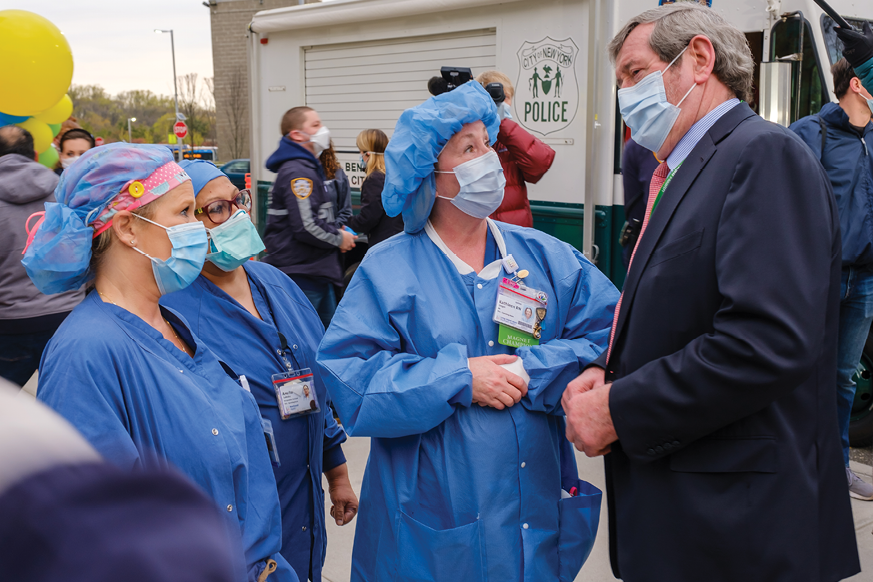
Frontline caregivers and essential workers have been
the true heroes of the COVID-19 pandemic. Michael Dowling
speaks with staff during an appreciation event for the
NYPD at Long Island Jewish Medical Center in April 2020.
Are you concerned about the industry’s ability to attract the talent and staffing needed to meet the future demands of healthcare?
This is always a concern given the dynamic changes that constantly occur and the expansion of new skills necessary for the future. The greatest asset of any organization is the people and the talents they possess. This is why Northwell has invested so much in innovative education and learning programs such as our medical school, nursing schools and our in-house corporate university, the Center for Learning and Innovation (CLI). We promote a culture of continuous learning. As we look at the future demands in healthcare, we have the ability to use our own capabilities as well as work with other colleges and universities to address the identified needs. What an exciting opportunity.
In leading an organization with such a long and deep commitment to New York, are you optimistic about New York’s recovery and rebuilding?
If you love New York and talk about how great it is, then you need to stand up and contribute. You can’t support New York by leaving it. There are many issues to address, but New York is a wonderful place. You only realize how special it is when you go somewhere else. Along with its vibrancy, creativity, innovation, diversity, and role as a microcosm of the world, New York is extremely resilient. It has gone through multiple transitions throughout the years, but it has survived and thrived. I am confident that we will pull together and make New York even better than it was before.![]()